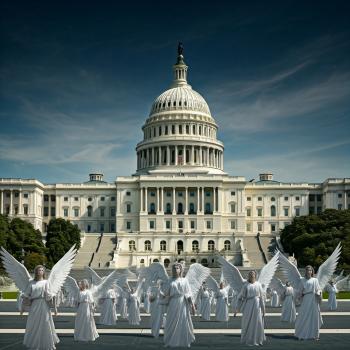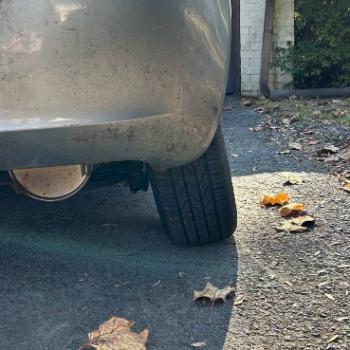Well, here’s something that doesn’t happen every century: “Pope Benedict XVI to resign, citing age.”
In a move that took the world by surprise, Pope Benedict XVI announced [today] that he will become the first pope in 600 years to resign, with plans to step down on Feb. 28.
“After having repeatedly examined my conscience before God, I have come to the certainty that my strengths, due to an advanced age, are no longer suited to an adequate exercise of the Petrine ministry,” Benedict told cardinals as they gathered in Rome for the proclamation of new saints.
Vatican spokesman Rev. Federico Lombardi said preparations for the conclave that will elect Benedict’s successor are in the early stages.
A papal election could be expected “within 10 to 15 days” after the resignation, he said. “We should have a new pope by Easter.”
Here’s the text of the pope’s resignation speech.
Let me get this out of the way first: If drafted, I will not run; if nominated, I will not accept; if elected, I will not serve.
OK, then.
That “first pope in 600 years to resign” line in all the reporting on this refers back to Gregory XII, during the Western Schism, when there were popes all over the place. That resignation was part of the attempt to get the Vatican back to the Vatican, so it’s not really similar to the voluntary resignation Benedict XVI announced today. The last time a pope left the office this way was more than 700 years ago, when Celestine V stepped down in 1294. (Josh Marshall is trying to sort out the history of all this.)
To put that in perspective, it’s been less than 17 years since the Catholic Church kept slaves. (Yes, in 1996, Bill Clinton was president, Yahoo’s search-engine was two years old, and the Roman Catholic Church had slaves.)
News agencies are hastily editing the reports from their ready-to-go obit files to produce retrospectives on Benedict’s seven-year papacy. Read the Reuters report Internet Monk posted and you’ll note the distinctly obituarial tone of such pieces. (The practice of pre-writing obituaries may seem ghoulish to those outside the news biz, but it’s a prudent, necessary measure.)
CNN’s Belief Blog also dips into that obit file for a helpful sidebar of “Facts About Pope Benedict XVI.”
William Lindsey has a good round-up of initial responses. I like John Dwyer’s suggestion: “Sister Joan Chittister, O.S.B. for Pope!” And I agree with Chris Hayes, “Call me crazy, but I think the next pope should be someone who didn’t help cover up child rape.”
Andrew Sullivan also has a good collection of responses from Catholic bloggers and writers.
Daniel Horan has a quick look at what Catholic canon law does and doesn’t say about papal resignations. The odd factor being that, “the Pope does not answer to anyone, so there is no ‘technical’ recipient of his resignation. All other bishops resign to him.”
As Andrew Brown observes, “the papacy remains the last absolute monarchy in Europe,” and such regimes are “traditionally renewed by death or disease.”
Brown thinks the current pope’s experience during the waning years of John Paul II’s papacy may have convinced him that the church would be better served by resignation than by a prolonged decline:
During the decrepitude of John Paul II, Pope Benedict, as Cardinal Ratzinger, was his right-hand man. It may be that his experience then planted in him a wish to leave office while he was still able to discharge his duties.
Whether or not that experience influenced Benedict’s decision, that is the explanation he provides, writing, “Strength of mind and body are necessary, strength which in the last few months, has deteriorated in me to the extent that I have had to recognise my incapacity to adequately fulfill the ministry entrusted to me.”
That’s wise. It seems in the best interests of both himself and the institution he oversees. There may be very little precedent for a papal resignation, but perhaps Benedict’s example will set a constructive precedent for his successors. When one is 85 years old and one’s “strength of mind and body” are no longer what the job demands, stepping down is a good thing.
That’s why Wonkette’s headline — “Pope Pulls a Palin” — may be a funny crack (at Sarah Palin), but the difference between his resignation and hers is telling. She was a young, healthy governor half-way through her first term in elected office when she just quit, walking away from the responsibilities that had been entrusted to her. At 85, after a lifetime in the church, Benedict isn’t a quitter. And his willingness to relinquish power seems more responsible to me than if he had taken the route of his predecessor, stubbornly clinging to power with increasingly unsteady hands.
Hemant Mehta suggests that others with lifetime appointments might learn from Benedict’s example and also take this sensible option of not overstaying their faculties:
Note to Justice Antonin Scalia, a man who is 76, fervently Catholic, and also holds a life term: Take the hint. It’s OK to step down.
See also this from Goblinbooks: “‘Don’t Believe HR About Why I Left,’ by Pope Benedict.”
















